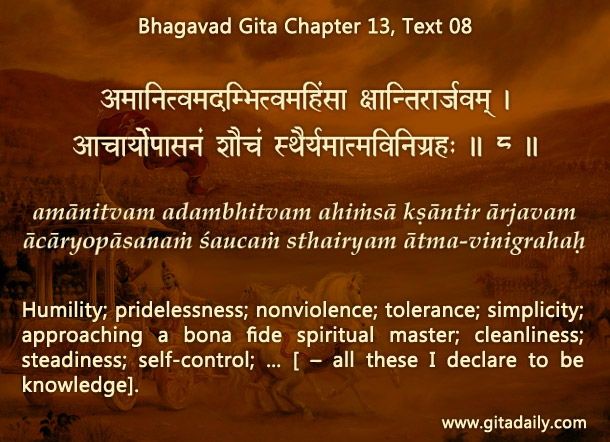Suppose we are driving for an important meeting but can’t find the venue. Even if we are driving a limo, we may not hesitate to ask someone riding a simple bicycle. Why won’t we hesitate? Because we are not interested in showing that we know more than them; we are interested only in knowing how to get to our destination.
When we see knowledge as a resource for acting effectively, we can easily acknowledge that there are things we don’t know and that those things may be more important than the things we know. And that acknowledgement is the essence of humility. Pertinently, the Bhagavad-gita (13.08) positions humility first among the virtues that comprise knowledge, thereby suggesting that humility is the doorway to knowledge.
In this sense, humility is just another word for curiosity. When we are curious, we naturally learn a lot and therefore know a lot, but our focus remains on what we don’t know. By that eagerness to know more, we stay humble. But we don’t demean ourselves or let others walk over us, which are sometimes feared as the consequences of being humble in today’s world. Such fears arise from a misunderstanding about humility. Actual humility is not about devaluing ourselves or devaluing what we know; it is about valuing what we don’t know and valuing others as potential sources of that knowledge.
Equipped with humility, we can learn not just from people but also from objects and events. When complemented by spiritual understanding, humility helps us see the whole universe as a living university. Therein, we can learn constantly from the Universal Teacher and feel enriched by his divine presence.
When we thus appreciate humility affirmatively as curiosity, it can make us warmer in our interactions, wiser in our actions and wealthier in our devotion.
One-sentence summary:
Humility is the empowering acknowledgement that what we don’t know may be more important than what we know.
Think it over:
- What is the essence of humility?
- Why are some people afraid to be humble? How are such fears unfounded?
- What are the benefits of seeing humility affirmatively as curiosity?
***
13.08: Humility; pridelessness; nonviolence; tolerance; simplicity; approaching a bona fide spiritual master; cleanliness; steadiness; self-control; … [ – all these I declare to be knowledge].
To know more about this verse, please click on the image
Explanation of article:
Podcast:



Nice,please keep it up
Wow! Amazing perspective of understanding of Humility defined in terms of curiosity. I also liked, the point that we don’t demean ourselves by this sense of humility. Its perfect balance. Thank you for sharing this wisdom and making our day. Very much grateful for all these valueable teachings. Thank you.
Thanks, happy to be of service.